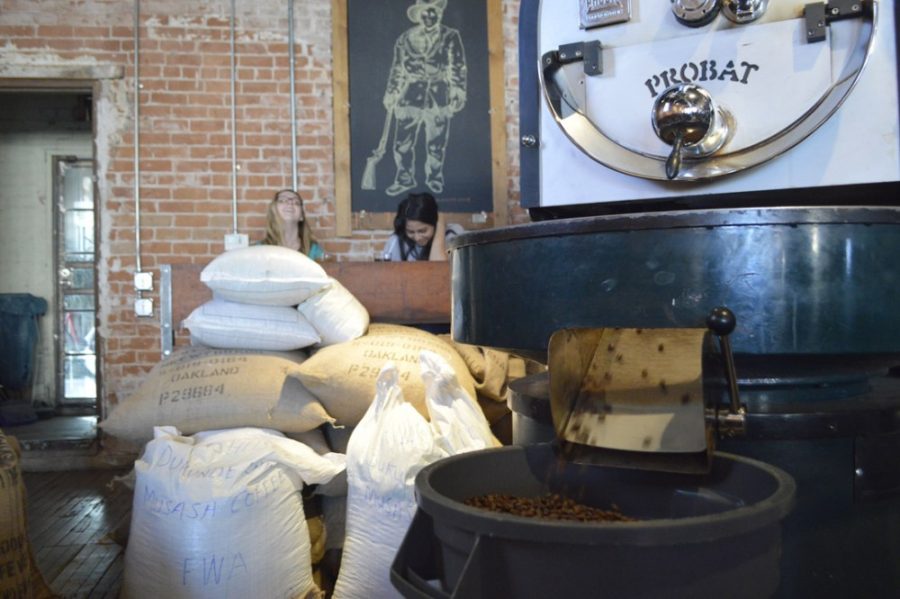Any customer unfamiliar with Exo Roast Company’s background and mission would easily label it as just another “hipster wannabe” coffee shop. It has the quintessential qualities: brick walls stained with different types of paint; black and white photographs mounted in vintage frames; rustic wood floors and tables scuffed from time; a shelf overloaded with a collection of records. And in case anyone thought the records were just for show, a record player sits nearby — slowing the pace of the shop with its soft melody.
Certainly, a young “flower child” sporting an Urban Outfitters plaid T-shirt and some Birkenstocks would fit in perfectly. But there is something more radical happening beneath the surface of this coffee shop that makes it more than just another bohemian hangout. In fact, it is a story that begins long before a cup of coffee is even served. It starts on the farm.
According to Doug Smith, one of the owners of Exo Roast Company, the beans Exo uses come from farms all over the world — from Central America to South America to Africa to Indonesia. When it comes to accepting or rejecting beans, Smith’s standards are pretty stringent.
“I do all the sourcing, which means that I investigate all the coffees that we’re interested in,” Smith said. “I make selections either by roasting some samples that brokers send me or [by] … just knowing what different brokers have to offer. The point is I’m very careful about what we purchase, and I want to make sure we have a pretty wide variety of coffee.”
In addition to his selective process of choosing beans, Smith said he is acutely mindful of the conditions on the farms from which they are obtaining their beans. Striving for social justice in the world of coffee, Smith said Exo is trying to reform the business for farmers.
“The coffee economy is notorious for being unjust to farmers,” Smith said. “In Mexico, most farmers sell their coffees to local middlemen who pay them just terrible prices … starvation prices. Under the best of circumstances, even if a farm … has fair trade … they still just barely can afford to make it. It’s not a lucrative thing, and we want to change that.”
In order to accomplish this, Smith said Exo buys beans from programs such as Coffee Shrub, which give better prices, Fair Trade prices or higher, to farmers. Currently, Exo is getting more directly involved with farmers in Costa Rica and Mexico.
“We’re helping farmers with quality control, enhancing quality, so that they get paid a fair price for their coffee,” Smith said. “So, that involves some real, on-the-ground work at the farm level.”
Once the beans enter the coffee shop, the complex roasting and extracting processes begin.
“One thing you learn once you learn about the world of coffee is that different coffees have very different characteristics,” Smith said. “So, they all need to be roasted according to those characteristics in order to bring out the best of those coffees, and that almost always means not over-roasting.”
Smith said the perfect cup of coffee is born from intense precision and diligence on the part of the barista. For example, to create the ultimate espresso shot, every morning, a barista must carefully calibrate the grind and modify the water temperature, among several factors, in order for the shot to be just right. As the day proceeds, all of those factors need to be reassessed and fixed as the climate and other variables change.
“We are very careful about training our baristas to extract [coffee] right,” Smith said. “Coffee needs to be purchased and roasted and extracted … to the best of one’s ability, so we make sure that happens.”
Shelly Hubman, a regular customer of Exo Roast Company, makes a visit to the shop almost every day and said her favorite drink is the “Americano.”
“I like the atmosphere,” Hubman said. “There are some good coffee shops in Tucson, but I think Exo has the best coffee. It’s consistently good. I like the music. [It’s] not too loud … as opposed to some coffee shops that blare really loud, very fast-paced music, and it’s hard for me to concentrate or relax.”
Exo owners said they want to educate their customers about the intricate process of how coffee is grown, roasted and extracted. Almost every Saturday, Exo Roast Company holds a “Public Cupping” where customers are invited to participate in a taste testing of five of its different coffees.
“I think the main takeaway for [the customers] is how different a really nice Ethiopian is from a really nice Guatemala,” Smith said. “It’s not just coffee. It’s very clear to you when you taste it how different they are.”
Smith made it clear that Exo is not just about making coffee. The company is about treating coffee-making as an art form — one that should be respectably practiced and widely appreciated.
_______________
Follow Madison Scavarda on Twitter.









